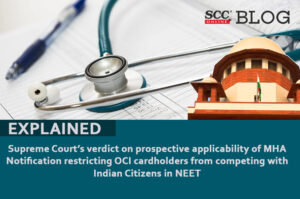Supreme Court: In a batch of petitions by Overseas Citizens of India (‘OCI’) cardholders seeking parity with Non-Resident Indians (‘NRIs’) and thereby Indian citizens for admission to National Eligibility cum Entrance Test (‘NEET’) and like exams withdrawn through a notification, the Division Bench of A.S. Bopanna* and C.T. Ravikumar, JJ. held that notification dated 4-03-2021 shall have prospective effect and that the petitioners shall be entitled to rights and privileges conferred on them through earlier notifications.
The present case points towards the sustainability of statutory classification between Indian citizens and Overseas Citizens of India cardholders. The petitioners are Overseas Citizens of India (‘OCI’) cardholders, preparing to appear for NEET-UG examinations, who just reached the full age (18 years) or below this age (age for renouncing or seeking Indian citizenship). Notifications issued by the Ministry of Home Affairs dated 11-04-2005, 05-01-2007 and 05-01-2009 announced OCI cardholders on a par with NRIs and eventually with Indian citizens for competitive exams and further admissions. The notification dated 04-03-2021 issued under Section 7-B(1) of the Citizenship Act, 1955 took away the existing right of appearing for the entrance exams to compete with Indian Citizens for the seats, restricting admission against seats reserved for Non-Resident Indians or supernumerary seats and specifically excludes OCI cardholders being ineligible for admission against a seat exclusively reserved for Indian citizens.
The petitioners contended that the impugned notification halts the Doctrine of Non-Retrogression taking away an existing right from OCI cardholders. The Government justified the same that OCI cardholders may be treated on a par with NRIs but ought not to be eligible for seats meant for Indian citizens.
The Court observed that except for being born on a foreign land, the petitioners have lived in India for almost 10-17 years, pursued education including class 12 to qualify for NEET-UG exam and pursue MBBS. And in most cases, either or both parents of the petitioners are Indian nationals.
The Court observed that the rights in the instant matter are statutory rights for petitioners not being Indian citizens, and that the state is duty bound to balance the interests of citizens and non-citizens.
The Court beautifully explained the origin of this matter with the words “These were cases where though the umbilical cord with the biological mother had snapped in a foreign country, the umbilical connections with the country continue to remain intact as the entire family including the grandparents would be in India and the parents were Indian citizens in most cases.”
The Court noted the petitioners’ details, most of whom were children of Indian citizens pursuing their studies in India for 6 or more years, thereby justifying the mid-path benefit given to them based on the OCI card through their conduct. It further added that the situation may not fall under ‘legitimate expectation’ in strict terms, but “a statutory right conferred had sown the seed of hope recognising their affiliation to this country.” Referring to Navtej Singh Johar v. Union of India, (2018) 10 SCC 1 regarding Doctrine of Progressive Realisation of Rights, the Bench opined that the observation regarding progressing society depends upon the nature of rights.
The Court also pointed out that the eligibility for admission to OCI students has been completely altered through the impugned notification. The Court added that “In a situation where there is a certain marked economic difference between OCI Cardholders and Non-Resident Indians to acquire such seats, the OCI Cardholders claim to be at a disadvantage and the right which was available to them earlier stood altered to their detriment.”
The Court acknowledged that having undertaken educational career in India or at least the High School onwards, they cannot turn back to their country of birth for securing professional education since competing with students, the study pattern and the monetary implication will be challenging. The Bench further inferred that the object of issuing OCI cards in 2005 was a response to demands for dual citizenship.
The Court commented that the impugned notification regarding the accrued rights of OCI indicates non-application of mind and arbitrariness. Eyeing at availing more seats for Indian citizens and the seats remaining vacant, the said notification lacks nexus with the object in the Court’s opinion.
The Bench viewed that retroactive operation resulting in retrospective consequences should be set aside and such adverse consequences are to be avoided. The Court held that the notification dated 4-03-2021 shall have prospective effect on persons subsequently born in a foreign country seeking registration as OCI cardholder. Thus, the Court held the petitioners entitled to rights and privileges conferred on them through earlier notifications.
The Court also clarified that when an already conferred right is withdrawn, modified or altered, the process should demonstrate application of mind, nexus to the object of withdrawal or modification and be free from any arbitrariness.
[Anushka Rengunthwar v. Union of India, 2023 SCC OnLine SC 102, decided on 03-02-2023]
∗Judgment authored by Justice AS Bopanna.

